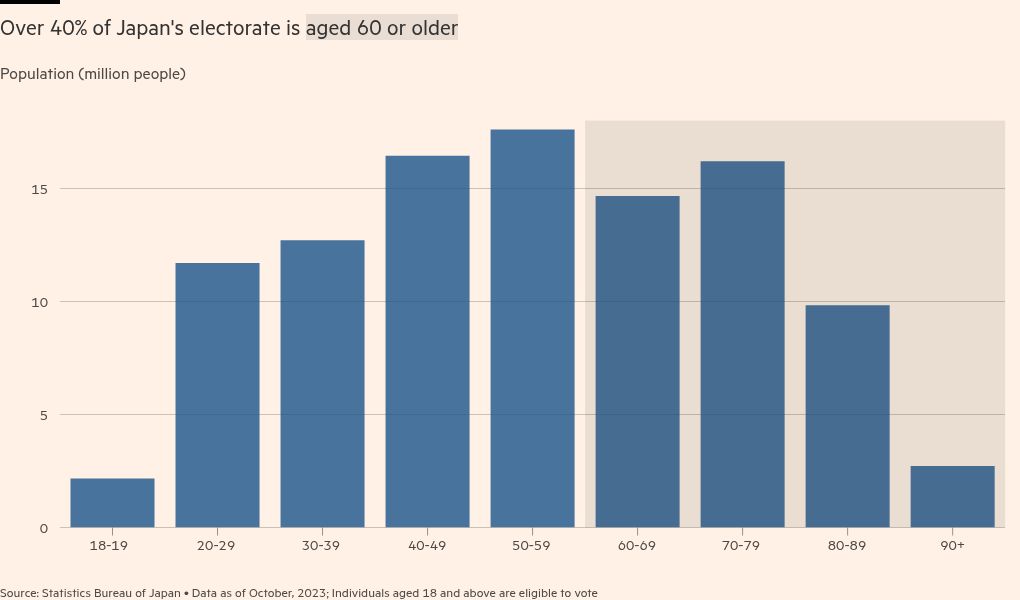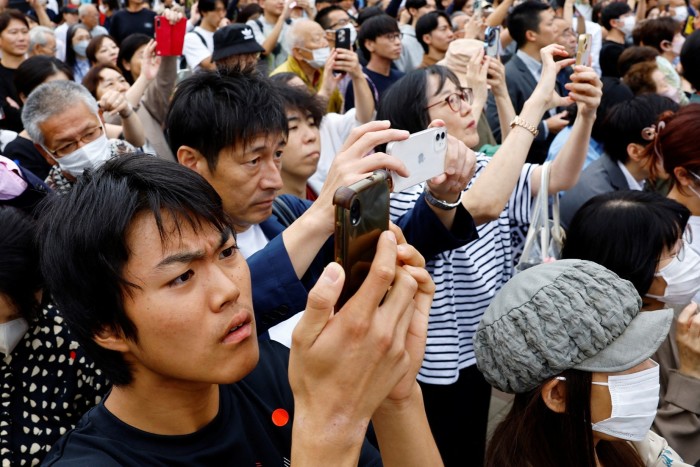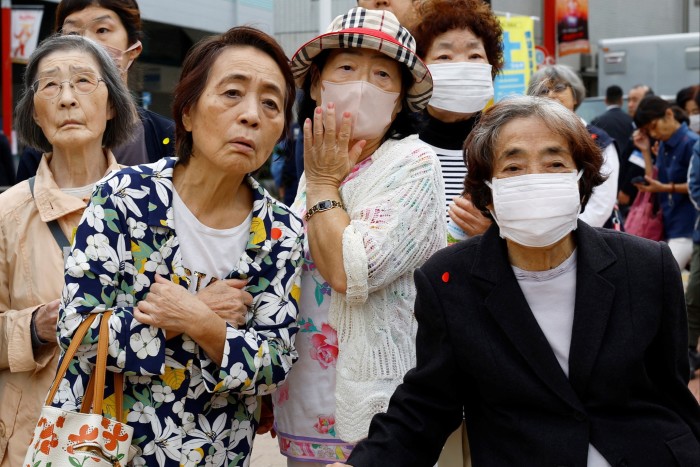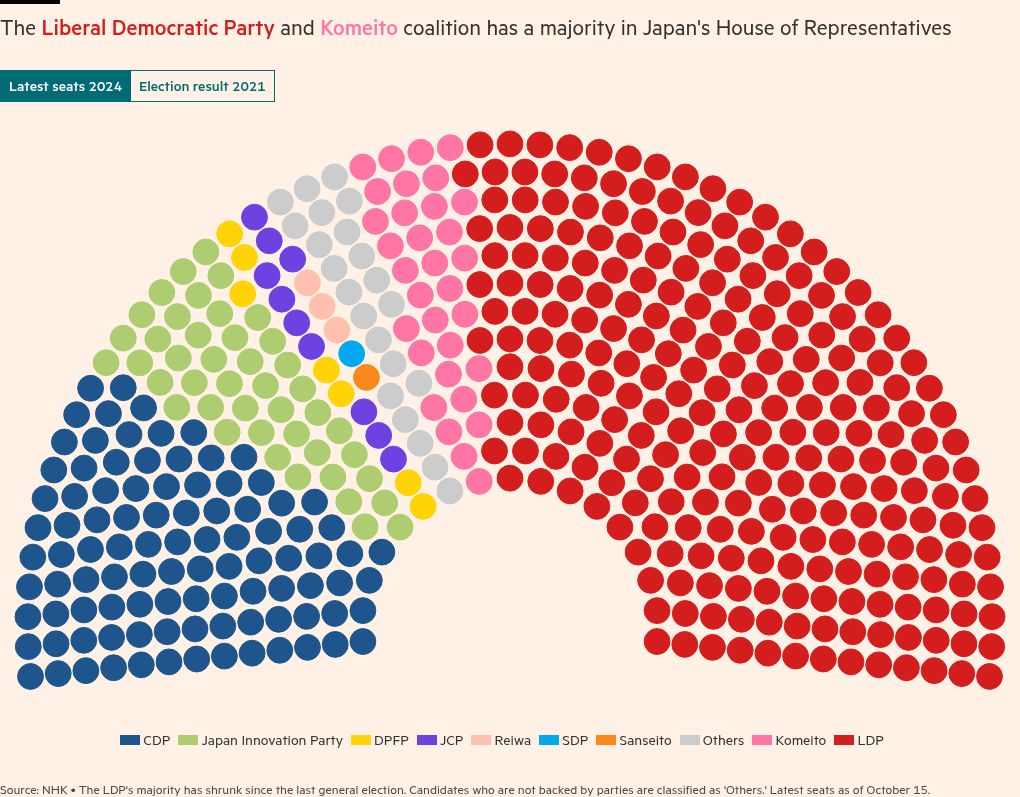
At 6am on the dot on Thursday, a 16-strong group of local residents began their daily callisthenics alongside a baseball field in central Tokyo.
The youngest was 72, the oldest in her late 80s, members of a generation that will wield outsized electoral influence thanks to demographics and political apathy as the world’s oldest nation prepares to go the polls on Sunday in a snap election.
It is a position of power with which they are not entirely comfortable, ahead of a vote that could loosen the grip on government of the long-ruling Liberal Democratic party and its new leader Shigeru Ishiba.
“It’s a shame. The younger people have the most to lose but they don’t seem to vote so much any more, do they?” said one, who gave her family name as Nemoto and her age at “around 80”. “They either don’t think they can change anything, or they have given up.”
“It ends up being old people like us who decide everything,” Nemoto said, adding that she would not be voting for the LDP, which the party that has controlled Japan for most of the past seven decades.
Both Nemoto’s age and her rising distrust of the LDP reflect critical factors, according to political analysts, in a potentially explosive election for the lower house of parliament that was called by Ishiba after he was elevated to prime minister earlier this month.
More than 40 per cent of the electorate is aged 60 or over, a globally unprecedented concentration of political power among people at or near retirement age.
They appear poised to disrupt the political stability that has characterised the country’s politics for more than a decade, as the LDP battles record low popularity in the wake of a political funding scandal and surging inflation that follows decades of low or no price growth.

Recent electoral history suggests older voters are much more committed than their younger counterparts. Turnout rates among over-60s average around 64 per cent, against an average 47 per cent for everyone younger. For the past three elections, among Japanese in their 20s, it has never risen above 37 per cent.
Part of the problem, said analysts, was that younger voters do not see themselves represented in the field of candidates. A recent Nikkei analysis found that among those standing in Sunday’s poll, only 11.6 per cent were under the age of 40 and just 23.4 per cent were women.
Momoko Nojo, director of the No Youth No Japan movement to promote young people’s interests in politics, warned that progress in raising the youth participation rate had been slow and that in its absence, bad policymaking would result.
“Young people decreasingly see politics as the mechanism for solving social problems,” she said.
Mare Yotsukura, a 20-year-old undecided voter and aspiring illustrator studying at Meiji University, agreed. “If a turning point doesn’t come and only the interests of the elderly are met, then we will just continue towards economic decay and political apathy,” he said. “We need generational change.”


But many voters have become disillusioned with Ishiba, who emerged from a nine-way leadership contest with a cabinet approval rating of just 28 per cent, one of the lowest ever.
“Ishiba went into this with an image of being a man of integrity and resolution,” said Jeff Kingston, a political scientist at Temple University. But the brash candidate who had called for an “Asian Nato” and boosting Japan’s underpopulated rural regions is now seen as a continuation of the status quo, having capitulated on a series of issues since taking office.
“People are realising that is not the Ishiba they have got”, Kingston said.
Analysts have warned that the LDP, whose image was already battered by the slush fund scandal, could lose its majority in the 465-seat lower house. Some opinion polls suggest the LDP’s coalition with its smaller ally Komeito could also lose the combined “absolute stable majority” of 261 seats or above that allows it to dominate parliamentary committees.
Some analysts say the LDP could be forced to seek additional partners among the smaller opposition parties after the election.
“We expected some form of punishment for the LDP in this election, but it now looks more seriously like they could lose their majority,” Kingston said.

Ordinary Japanese are also wrestling with rising consumer prices and a weak yen, which have conspired to counteract recent wage increases that, while large by historic standards, were not enough to make families feel wealthier. This has sharpened disgruntlement of the over-65s, whose fixed incomes make them more vulnerable to rising food and living costs.
Ishiba had aimed to use a sudden snap election to catch the opposition, led by the Constitutional Democratic party of Japan of former prime minister Yoshihiko Noda, unprepared. With little time to co-ordinate during a two-week campaign, the opposition was unable to form electoral alliances and tactically run non-LDP candidates in each constituency.
But even without that strategising, said political analysts, the election has not produced a sprawling field in many constituencies. Nemoto and her friends, for example, were running through their morning exercises in a borough with only three choices of non-LDP candidates.
“It’s a poor choice this time,” she said. “I really do not see much that is attractive about the CDPJ and its policies don’t seem very different from the LDP, but we need some sign of change in politics so I will have to vote for one of the other non-LDP parties.”
Her decision, if replicated across the vast bloc of over-65 voters, will force the LDP to rely on younger voters. Eri Hiragata, a 21-year-old finance student, is in the minority of young people who plans to vote, and will do so begrudgingly for the LDP.
“It’s the LDP by process of elimination,” she said. “It would be even worse if we left it to any of the other parties.”
Data visualisation by Haohsiang Ko